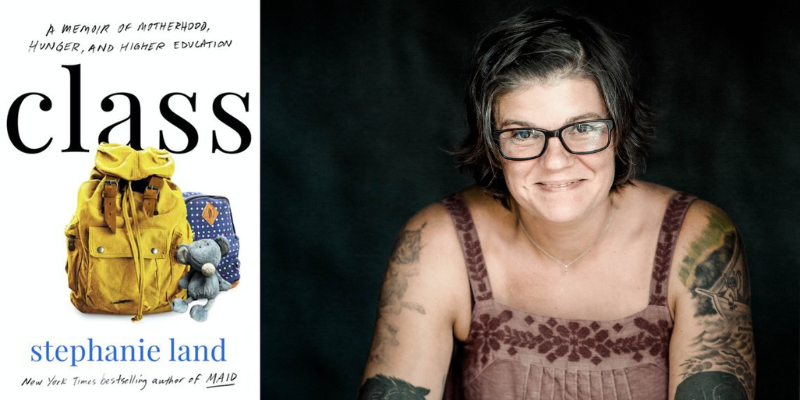
Stephanie Land On Allowing Herself To Get Angry
In Conversation with Maris Kreizman on The Maris Review Podcast
This week on The Maris Review, Stephanie Land joins Maris Kreizman to discuss Class, out now from Atria.
Subscribe and download the episode, wherever you get your podcasts.
*
from the episode:
Maris Kreizman: You talk a lot in the book about the idea of the deserving poor, how someone who needs assistance is supposed to act. It seems like you’ve dealt with many judgmental people in your life.
Stephanie Land: Yeah. The deserving poor to me is a person who found themselves in a circumstance without any effort on their own part. Like, a single mom who is that way because her husband died tragically trying to rescue the family dog in a fire. Like, she is deserving poor. She is the type who we have GoFundMes for, and everybody gathers together to support her.
But a single mom who decided to get with this guy who was really awful and then left him and was homeless and is now trying to go to college? Like, I didn’t really feel I was ever deserving poor. I was, well, you made bad decisions and so now you made your bed and you have to lay in it. I even felt that way with writing my first book. I almost felt like I needed to present this story that was apologetic and kind of a “please sir, may I have some more” type of Oliver Twist type of thing. And with this book, I felt like I could be a little angry.
MK: One of the real thrills of reading this book is you are finally in a position where you can write whatever the fuck you want and you don’t have to worry about consequences overwhelmingly.
SL: I do like to tell myself that I’m not going to have consequences. It feels like I’m not going to, but I am a person who lives with anxiety. So the anxiety talks a lot louder sometimes. But it felt really good. I didn’t even realize that I was still angry about things until I started writing about it.
And there are a couple of sections in the book where I’m getting up on my soapbox and yelling about this thing that has always really bothered me. And it was fun. I really enjoyed it. I enjoyed writing about being angry and I know from experience and just my job as a public speaker, I talk to a lot of people all across the country and angry people, especially angry people of color, are often ignored and pushed aside and silenced. And so I thought I have the opportunity to raise an angry voice in a way that people might listen to and possibly even accept.
MK: Yeah, that all goes back to the idea of the deserving poor. A deserving poor person wouldn’t be angry. They’d be easygoing and grateful for whatever scraps, it seems.
SL: Yeah. I very much felt like I just needed to shut up and be happy.
MK: And one of the things that is so frustrating about your experience with governmental agencies and the family court system is that they come at you from a position of suspicion. You’re constantly having to prove your worthiness. I’m involved in a couple of mutual aid groups, and when people ask for things, we just assume that because they have to ask for them that they really need them and we’re not really trying to figure out who’s scamming us.
SL: That’s really nice of you. That assumption was never made about me. When you’re asking for food stamps, for example, they ask if you have a burial plot. They ask the value of your car, they ask if you have any jewelry that might have some value, and it’s so embarrassing and invasive. But you’re doing it so that you can feed your child, and that part of it became so normal for me to have to answer all of these questions. Someone pointed out a couple of weeks ago that maybe that extended to writing because it’s just like, people tell me I’m brave for writing about all these personal things, but I started to think about it and I’ve been doing that forever.
MK: I was going to say, memoir is kind of the form in which readers come to the experience perhaps more judgmental than not.
SL: Yeah. I feel like when it’s a woman writing a memoir, the judgment is on the person and not so much on the writing or how well it’s written, even. It’s always me who’s scrutinized. It’s not my ability to write a story.
*
Recommended Reading:
Poverty, by America by Matthew Desmond • The Deeper the Roots by Michael Tubbs • Somebody’s Daughter by Ashley C. Ford
__________________________________
Stephanie Land is the author of the New York Times bestseller Maid: Hard Work, Low Pay, and a Mother’s Will to Survive, called “a testimony…worth listening to,” by The New York Times and inspiration for the Netflix series Maid. Her work has been featured in The New York Times, The Guardian, The Atlantic, and many other outlets. Her writing focuses on social and economic justice and parenting under the poverty line. She is a frequent speaker at colleges and national advocacy organizations. Find out more at @Stepville or Stepville.com.
The Maris Review
A casual yet intimate weekly conversation with some of the most masterful writers of today, The Maris Review delves deep into a guest’s most recent work and highlights the works of other authors they love.



















